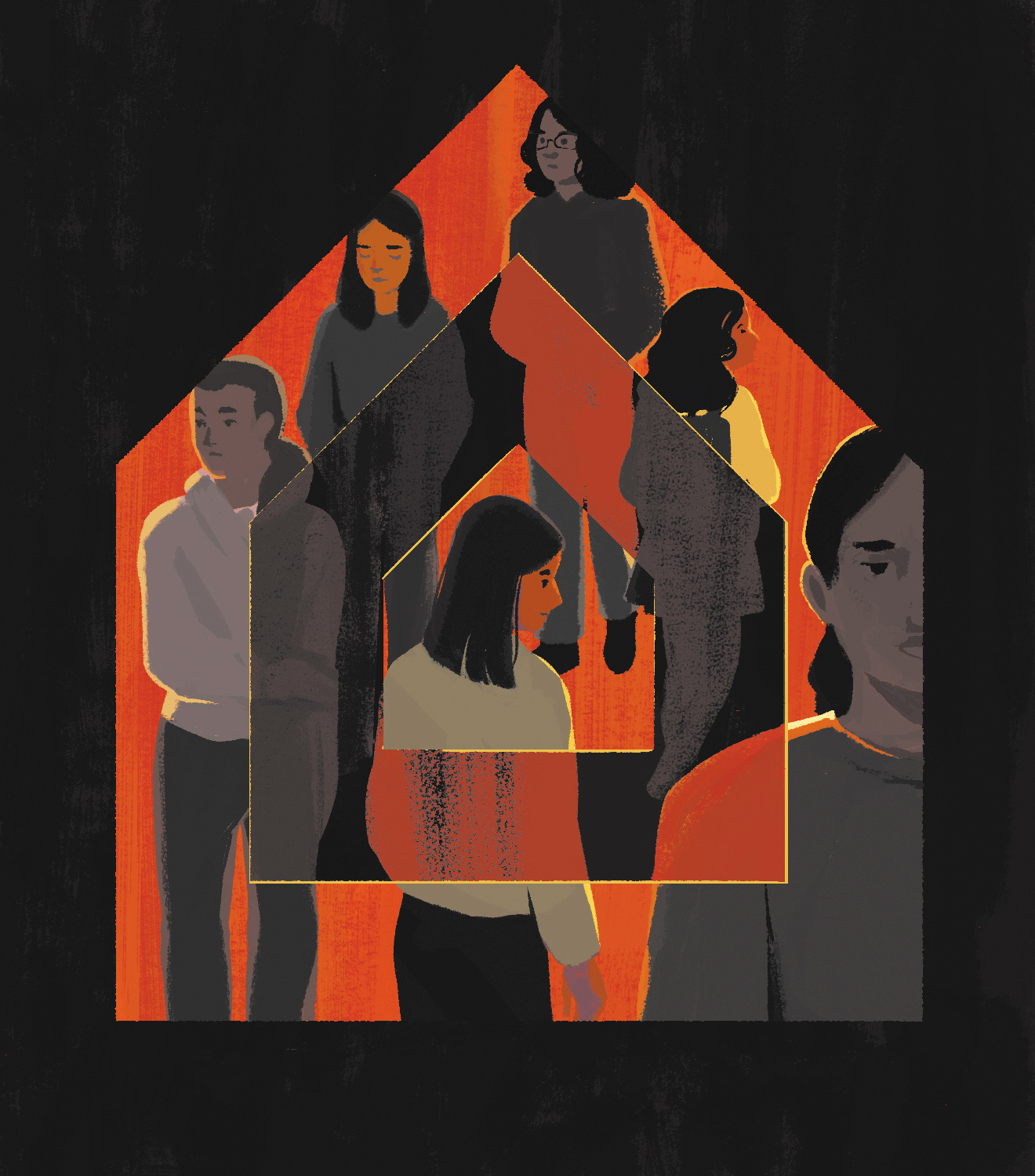Last fall, two women filed separate multi-million-dollar civil lawsuits against the Meeting House, one of Canada’s largest megachurches, alleging that they had been victims of sexual abuse by a former youth pastor at the church while the women were minors, The Walrus has learned. The two lawsuits join another previously unreported civil suit, filed in 2022, against the church and concerning sexual abuse, assault, and molestation by a separate former youth pastor—each of the three seeking $5 million in damages, alleging a breach of duty of care owed to the women as young parishioners.
Founded in 1986 in Oakville, Ontario, the Meeting House grew rapidly during the 2000s under the leadership of Bruxy Cavey, who joined as lead teaching pastor in 1997. The church was a pioneer in recording and disseminating Sunday sermons, livestreaming them across its satellite locations and online, and it became particularly popular with young people. In 2021, the church was publicly embroiled in a scandal when allegations of sexual abuse emerged against Cavey. (None of the three civil cases pertain to Cavey.)
Each of the three statements of claim in the civil cases alleges that the church “created the risk of sexual assault that led to and allowed” church leaders “to sexually assault” the complainants. The church, the women claim, failed in its duty to “properly supervise its employees” and failed to “instruct its employees . . . about the possibilities of becoming sexually deviant and/or making advances to members and/or other young people.”
The Walrus is not using the real names of the women in the civil cases as their identities remain under publication bans from previous criminal proceedings in sexual abuse, assault, and exploitation cases reported last year in The Walrus. Those proceedings resulted in criminal convictions against youth pastors Kieran Naidoo, in 2014, and David Churchill, in 2015.
During his three years as a youth pastor at the Meeting House, Naidoo was known for his charisma and for forging friendships with members of the youth group referred to as the Underground. In 2008, church leadership asked Naidoo to resign from his role after another youth group leader discovered sexually explicit messages between him and an underage girl from the youth ministry. But Naidoo continued to work with youth at other churches for years after his resignation, Naidoo’s ex-wife, who was also a youth pastor at the Meeting House, previously told The Walrus. Around 2011, Naidoo’s ex-wife says, she found sexually explicit videos and images of several girls from the Meeting House youth group on her then husband’s hard drive. In February 2012, Halton police arrested Naidoo and charged him with sexual exploitation, possessing child pornography, and invitation to sexual touching. Naidoo pleaded guilty to six charges involving four victims who attended the Meeting House—two of whom are the women who have filed the new civil proceedings against the church. Naidoo was sentenced to three and a half years in prison.
Around 2010, the Meeting House hired another youth pastor, David Churchill. He was well liked and provided one-on-one counselling to youth, including one fourteen-year-old girl. By 2013, Churchill and the young girl had “engaged in sexual activity,” and they both “believed themselves to be in love and in a relationship,” according to court records. In July 2014, Churchill, then twenty-eight, was charged by Halton police with sexual assault and sexual exploitation against the girl, who was seventeen. Churchill pleaded guilty in 2015 and was sentenced to six months in jail and sexual misconduct counselling.
Through the three civil lawsuits, the Meeting House as an institution is being compelled to defend itself by explaining what it knew and when—and how well or poorly it protected its congregants, particularly children, from abuse and misconduct. The claims allege that it was the entire system, and not just a few individuals, that seemed to protect abusers and abandon the church’s most vulnerable members. “I feel like they do need to be held accountable for the actions that they’re choosing,” says Jasmine, referred to here with a pseudonym, who met Naidoo around 2005, when she was approximately eleven years old, and is one of the women who is suing the church. “I’m trying to heal and I don’t feel that I can properly heal without them taking responsibility.”
The first civil lawsuit, filed in August 2022, outlines one of the women’s experiences with Churchill starting around 2013. She notes she met Churchill in his role as youth pastor, and he became a trusted authority figure. Over the years, Churchill “repeatedly sexually abused, assaulted, and molested” her. As a result of Churchill’s crimes, already proven in court, the woman suffered a myriad of long-standing negative impacts, she notes in the statement of claim, including physical pain, mental anguish, shame, depression, and the “impairment of her ability and opportunity to experience a normal adolescence and adulthood.” The Meeting House, the woman continues, “implemented and maintained a system which was designed to cover-up the existence of such behaviour if such behaviour was ever reported.” She adds that the church “failed to take steps to investigate the activities of Churchill, once it was fully aware of his shortcomings in an effort to locate and assist any victims including [the woman].”
In its statement of defence, the Meeting House denies her allegations and her claim that it breached its duty of care. Prior to his hiring, Churchill, the church claims, passed a criminal background check that “did not reveal any history of sexual misconduct and/or child abuse.” The church also points to an abuse prevention policy it claims it had in place at the time of Churchill’s employment, adding that it prohibited a staff member from being alone with a child, prohibited inappropriate touching, and required parental consent for any meetings involving the child outside of regular church programming.
The church claims it did not learn of any suspected abuse on Churchill’s part prior to June 2014, when it was advised of “an inappropriate physical and/or sexual relationship” between Churchill and the woman. Churchill was immediately put on leave, the church writes, and he resigned within a week. The church states it reported the abuse to the police despite the woman and her mother saying they did not want it to. “The church provided gratuitous financial support to [the woman] to fund therapy and counselling as a result of the abuse,” the church writes. “This support ceased in 2022, at [the woman’s] request.”
In January, a Hamilton court ruled in favour of a motion by the Meeting House to dismiss her case. Matthew Lefave, the lawyer representing the three women, would neither confirm nor deny whether any settlement, financial or otherwise, had been reached. “All I would say is it’s very commonplace, that after matters resolve, that one of the parties will take out an order dismissing the action,” Lefave says. “Beyond that, I can’t speak to any details as to the resolution.”
The two remaining statements of claim against the church, filed in October and November 2023, list similar harms the two women have experienced as victims of Naidoo. Both of those women, whom The Walrus previously referred to using the pseudonyms Jasmine and Amber, attended youth groups at the church overseen by Naidoo, received counselling from him, and attended Bible studies led by him. “These activities were carried out for the stated purpose of advancing the youths’ . . . spiritual understanding and relationship with God,” the women state in their claims. All three of the women say they have been required to undergo medical treatment and psychological counselling as a result of the abuse, something they say will need to continue indefinitely.
Amber alleges in the civil court documents that Naidoo began abusing her when she started attending the Meeting House at the age of nine—and that the abuse continued as she grew older. He made her feel special and used his position of authority and trust to ensure that she did not tell anyone about the behaviours in which they engaged, she states. She alleges that the church failed to properly investigate Naidoo’s background and psychological state prior to hiring him; failed to warn Naidoo’s immediate supervisors, colleagues, and members of the church who may have come into contact with him of his propensity for abuse; and failed to have any self-reporting or counselling in place for employees. “If it wasn’t for the Meeting House, I would have never met [Naidoo],” Amber says. “I hope they do their job of not turning a blind eye and actually accept that bad things do happen in the church and they need to do better.”
Jasmine makes similar accusations against the Meeting House in her statement of claim: that the church failed to protect her and adequately respond to her claims of sexual assault, abuse, and molestation by Naidoo. She also alleges that the abuse and the church’s lack of response to it have caused long-term harm to her mental health and well-being. “A lot of us are still suffering from many different things, not just the specific acts themselves but all the things that have gone on since then,” Jasmine says. “I do also feel that a lot of the people that were affected would be in much different places, probably a lot more well off financially, maybe would have made better decisions with friends and family relationships.”
While the church has yet to file statements of defence regarding Amber and Jasmine’s suits, Lefave believes it intends to in the coming months. (The Meeting House declined to comment on the civil cases. In a statement to The Walrus, Tonia Blenkarn, chair of the Meeting House Network Transition Board, wrote in an email: “The Meeting House continues to work through our difficult past while maintaining appropriate confidentiality in these matters. Our heart is for people to develop meaningful Jesus centered relationships and we grieve when that fails.”)
According to Peter Schuurman, a Christian academic who spent years at the Meeting House as part of his PhD research and book on the church, these civil cases point to questions around whether financial compensation for victims will be part of the church’s efforts to make amends. “While Christians may be sometimes too quick to talk about forgiveness and reconciliation, they also need to be aware of the call of faith to restitution,” he says. “And whether or not [these cases are] a just form of restitution, the courts need to decide.”
The Meeting House became embroiled in sexual abuse scandals at the end of 2021, when a woman alleged that Cavey, the church’s former lead pastor, had sexually abused her when she had been in the church between 2012 and 2018. The church put him on a leave of absence while a third party investigated the matter.
After the allegations emerged, Cavey published a now-deleted post, titled “My Confession,” on his website, in which he wrote “at the core of the allegations there is truth.” He described the relationship between himself and the woman as an “extramarital affair,” which he said was his “greatest failure, my darkest sin.” He wrote that he had been “irresponsible in my role as a spiritual leader and Christian clergy, which involves dynamics of power and influence and an expectation of exemplary conduct that makes me doubly accountable.” In response, the church hired Melodie Bissell, a third-party victim advocate, who received more accusations of misconduct and abuse against other current (at the time) and former male church leaders.
On May 31, 2022, Hamilton police charged Cavey with one count of sexual assault. Cavey has maintained his innocence in the criminal charge and is expected to plead not guilty at trial. “He is eager to proceed to trial and clear his name,” Cavey’s lawyer, Megan Savard, previously told The Walrus. He is currently awaiting trial.
An interim leader at the Meeting House told The Walrus last year that the church had received fifty-eight referrals from the victim advocate, of “allegations, disclosures, and concerns relating primarily to clergy sexual misconduct, harassment, and abuse by a number of former pastors and church leaders.” (Some allegations are repeated or are second hand. The criminal convictions against Naidoo and Churchill were also raised again, as many members of the church were not aware that they had occurred years earlier.) Bissell has since resigned from her role as victim advocate for the church, telling the CBC she became concerned that the church had “different priorities” from hers. Specifically, the church had decided that Bissell would no longer be the first point of contact for people coming forward with complaints and allegations. Instead, it would be a representative from Be in Christ Church of Canada, the Meeting House’s parent denomination, who would then forward the complaints to Bissell.
Last summer, while Cavey awaited trial, he launched a website called The Ghost of 1820, as first reported by the Christian media outlet The Roys Report. “My name is Bruxy…and I’m a mess,” the site’s welcome page reads. “But I am discovering that suffering, especially from self-inflicted wounds, can be a good teacher, and I am learning so much.” The site’s name, Cavey noted, refers to Matthew 18:20 in the Bible, which he wrote as: “Wherever two or three gather in my name, I am there in the middle with them.” (The verse is more commonly written as “For where two or three gather . . . ”) The site’s “Small Church” page describes small gatherings where Cavey and his family have been invited to join as they “quietly engage in spiritual truth-seeking.” He states that he neither started nor led these groups but they are “places where confession and repentance feel welcome, and where forgiveness and encouragement are abundant.” The website includes a link to make donations to his project.
In December, Cavey was charged with two additional counts of sexual assault involving another woman, whose identity has not been released. “It is unfortunate that a new and unrelated allegation has surfaced on the eve of Mr. Cavey’s trial,” Savard said in a statement to media. “Mr. Cavey maintains his innocence and will vigorously defend against the new charges in court. In the meantime, he remains focused on and committed to clearing his name at his upcoming trial.”
Since the allegations against Cavey and other church leaders emerged, at least one location of the Meeting House, in London, Ontario, has shuttered. There are currently twelve satellite locations, down from its peak of nineteen. Schuurman says he continues to hear of congregants leaving the church as well as dissent growing within the church body over the sexual abuse and misconduct allegations. “With each subsequent revelation of failure at the Meeting House,” he says, “more and more people will realize the reality and the gravity of what has happened and it will continue to hemorrhage [members].”






